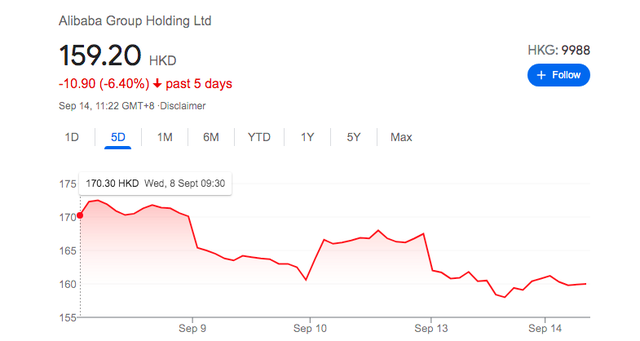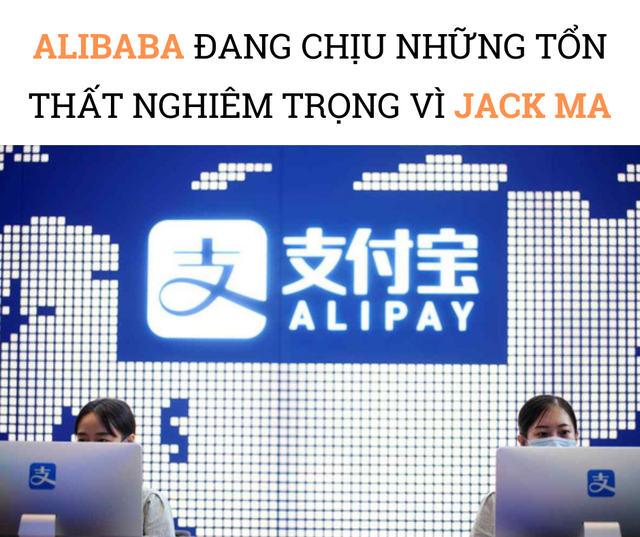Build 20 years destroy in 1 hour: Jack Ma made Alibaba’s capitalization evaporate $ 380 billion after 1 year, lucrative business segments were cut one by one
- Tram Ho
Alibaba’s stock price fell again on Monday after the Financial Times reported that Beijing was planning to split Alipay, the hugely popular payment app owned by the public company, CNN reported. Ant Group financial technology.

But that wasn’t the only news that led to a drop in Alibaba stock. Investors are also concerned that Beijing is intensifying its crackdown on big tech companies. The evidence is that regulators ordered internet companies – including Alibaba and Tencent – to stop blocking rival links on their platforms.
Alibaba (BABA) shares fell as much as 7% on the Hong Kong Stock Exchange, before recording a total decline of 4.2% by the end of the session. Notably, the company’s stock has dropped 46% since early November 2020, when Chinese regulators suspended Ant Group’s massive IPO at the last minute, blowing away about $380 billion in value. Alibaba’s marketplace. Ant Group was spun off from Alibaba in 2011, but Alibaba still owns a third of the fintech company.

Since suspending the IPO, regulators have ordered Ant to restructure as a joint stock finance company, and now the super app Alipay seems to be the next target. According to the Financial Times, China wants to split Alipay and create a separate app for its lending business.
Chinese regulators have ordered Ant to separate its two lending businesses: Huabei, which is similar to a traditional credit card, and Jiebei, which makes small unsecured loans. In addition, the authorities also required the company to attract more outside shareholders.
Now officials also want the two businesses to be separated into a standalone application. The plan would also require Ant to turn over user data that underlies its lending decisions to a new, partly state-owned credit-scoring joint venture, two sources familiar with the matter said.
Ant and the People’s Bank of China were not immediately available for comment.
Alipay has grown without much scrutiny over the past decade, but now authorities are paying more and more attention to the extent of the tech industry’s influence on the country’s economy. Ant, for example, controls more than half of the mobile payments market in China.
Data treasure
At the heart of the problem is the fact that lawmakers believe that Ant Group – the company in which Jack Ma is the main shareholder is holding a greater competitive advantage over small lenders and even big banks thanks to Huge amount of personal data collected from payment and lifestyle app Alipay.

This app is currently used by more than 1 billion people. As a result, they have at hand a huge store of data about users’ spending habits, debt and bill payment history.
Leveraging that mass of information, Ant made loans to half a billion people. However, their method is to lend through the capital of 100 commercial banks. Thus, banks will bear most of the risk of bad debt from borrowers while Ant only pocket profits as the middleman.
Therefore, asking Ant to transfer user data to a new, partly state-owned credit-scoring joint venture is not surprising.
Although Ant is a shareholder in the credit rating company mentioned above, it has not shared the data so far.
“How to manage data exclusivity is at the heart of the problem here,” according to one analyst.
“Credit history and credit score if more public is a good thing,” said Martin Chorzempa – an analyst. “This can help make lending more competitive and avoid over-borrowing.”
For years, China’s financial planners, led by the Central Bank, have worked together to build a credit scoring system similar to that of the United States. The effort is an extension of a “digital stewardship” initiative aimed at harnessing data and technology with a greater degree of economic and social control.
Jack Ma is perhaps the most innovative and innovative Chinese businessman in recent decades. His Alibaba group used to use the data it had to help authorities find criminals. When the Covid-19 epidemic occurred, Ant’s Alipay payment application was equipped with a tracking function to help the government control the epidemic.
For the past two years, however, Jack Ma has resisted China’s attempt to make Ant’s personal credit data public.
In 2015, Ant set up its own credit scoring system called Zhima Credit. Three years later, the People’s Bank of China launched a personal credit reporting company called Baihang Credit and Ant, Tencent and six other companies were invited to be the main shareholders of this company.
The idea was to get Ant and others to share customer credit data that could then be accessed by financial institutions across the country.
However, this plan failed. Ant refuses to contribute their data to stay competitive. Jack Ma himself in recent months has missed his mouth when he criticized Chinese banks and government regulations, which he said did not understand the internet.
Since then, storms have begun to come, causing Jack Ma’s empire to shake strongly.
Source : Genk
